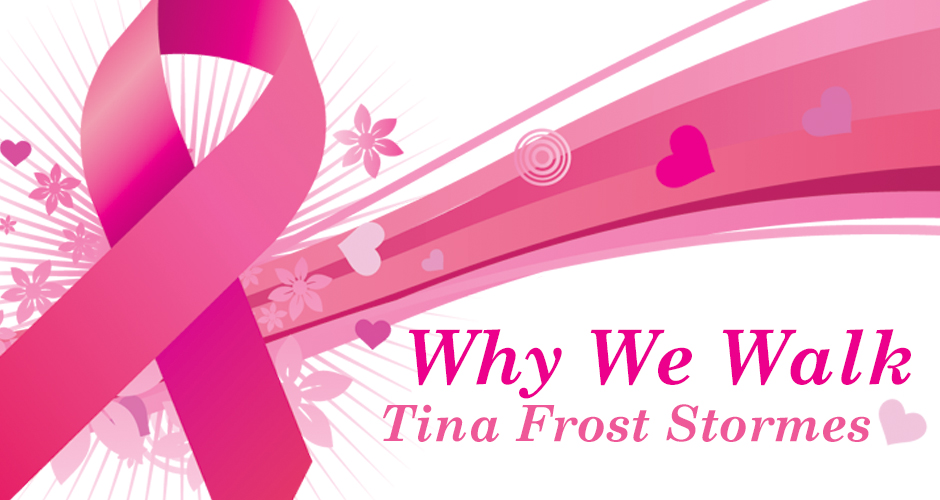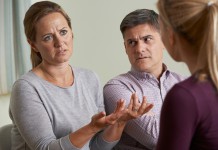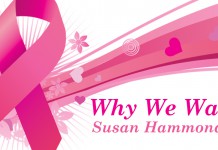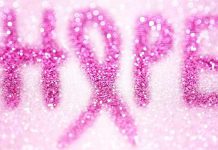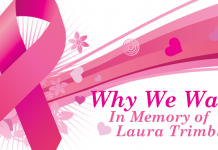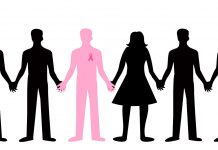Throughout Breast Cancer Awareness Month, HCDO has shared testimonials from survivors and family members of those who have passed away from breast cancer. We conclude our ‘Why We Walk’ series with Tina Stormes, a survivor who credits faith, perseverance and an early detection as reasons for getting through a tumultuous time in her life.
Her message: “It all starts with YOU. Do your self-examinations. Our bodies do talk to us and tell us things. Listen carefully. Early detection is the answer.”

This is Tina’s story:
Can you briefly tell us a little about yourself?
I am 48 years old and married for the 2nd time to the love of my life, Greg Stormes.
I was a paralegal for 14 years and now I am trying to make a living at what I love to do, salvaging and refurbishing antique and vintage furniture. I am the mom to my natural children (Alexander-23, Brooke-21 and Casey-16) and the proud step-mom to Christopher-30, Danielle-27 and Brittany-21.
How old were you when you were diagnosed with breast cancer?
I was diagnosed September, 2009. I was 42. The doctors diagnosed me at stage zero.
How was the cancer detected?
I found it during a self-examination.
How did you and your family react to this news?
My immediate thoughts were of my children. Just three days after being diagnosed, my best friend and neighbor moved back to her home state of Idaho with her son. My best friend Kim was everything to me. She would run errands for me, watch the kids after school and I would cook our dinners every night. We would sit outside in the evenings with a beer or glass of wine, watch the kids, play with the kids, plant flowers, socialize with neighbors and go on walks. We even weathered two hurricanes together (Jeanne and Wilma). We were inseparable.
On top of that, two days after Kim moved away and five days after being diagnosed, my year-long relationship fell apart. The two most important people in my life at the time were now gone from me. In my very stressed out and heartbroken mind, I wasn’t about to risk telling someone and having them leave me.
What was the treatment process? How did this affect your family?
My treatments consisted of targeted radiation for several days a week, for six weeks. Leading up to that, I had found a lump in a shower self-exam, went to the OBGYN and they confirmed the lump and ordered a biopsy, which was positive. I was scheduled to have radiation and six weeks after that, once the lump stopped responding, I went for surgery. I woke up to find out that the cancer was gone. The surgery was a success and my lymph nodes were clear!
I was also raising three kids at the time and working full-time. I would leave work, go to radiation and then come home to care for the children and then go to bed. The children believed I was tired from working so much overtime. I remember being in a fog. It was my faith in Jesus Christ who provided my strength. He’s the only way I got through it all.
[pullquote align=”full” cite=”” link=”” color=”” class=”” size=””]”Having breast cancer and dealing with it alone actually helped me find myself, my voice, my strength and my purpose again. I feel it saved my life.”[/pullquote]
How has breast cancer affected your outlook on life?
Having breast cancer and dealing with it alone actually helped me find myself, my voice, my strength and my purpose again. I feel it saved my life – it opened my eyes wide to what was most important and it helped realign my boundaries. It also changed my perspective on what I should or should not settle for. Overall, I have more awareness, more compassion, more patience and more love.
What advice would you like to give people about breast cancer?
For me, it all starts with YOU. Do your self-exams. Our bodies do talk to us and tell us things. Listen carefully, early detection is the answer.
Do you participate in breast cancer walks? Why do you walk?
I have participated in walks – just my friend, Jackie and I, but our team at the time was Lovely Lady Lumps.
I still mostly keep my experiences to myself. Sometimes I find myself struggling with guilt over having (what some might call) an “easy” time with breast cancer – compared to what others have gone through. But, my experiences have made an impact. I have helped counsel others when referred to by friends or loved ones.

According to breastcancer.org, about 12% of U.S. women will develop invasive breast cancer over the course of their lifetime.
Increase your odds of early detection by completing self-breast exams, staying updated on yearly screenings and keeping educated about early warning signs of breast cancer. Be proactive and get a screening done today – it could help save your life! Special thanks to everyone who helped us with the ‘Why We Walk’ series this year!


